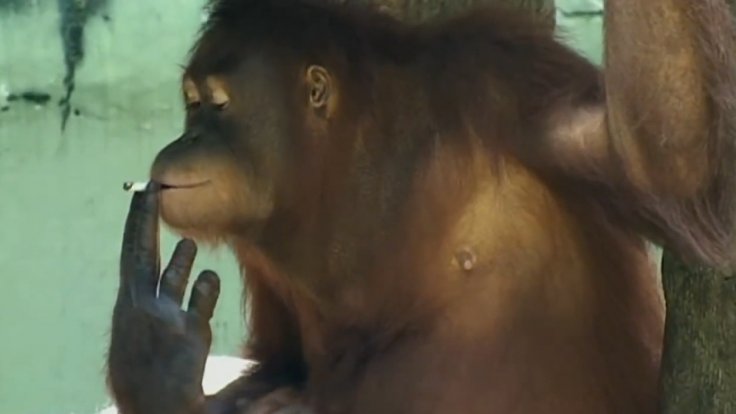
An irresponsible zoo visitor was caught live on camera tossing a half-smoked cigarette to a Bornean orangutan named Ozon at a zoo in Indonesia. Soon, the orangutan picked it up and started smoking.
The video which was shot on Sunday, March 4 at Bandung Zoo is already going viral. The visitor threw his half cigarette towards an eddish-brown primate which picked it up, settled on the ground and started smoking the way humans do. Even though zoo visitors found it funny and entertaining, the video has raised the eyebrows of many animal welfare activists.
The unhindered practice is prohibited and the zoo authorities have already warned people via signboards not to throw cigarettes to orangutans. Now they have filed a report with the local police.
Indonesia Animal Welfare Society founder and activist Marison Guciano, who was tipped about the incident shot back accusing that the visitor of a grave crime against animals and taking on zoo authorities for letting such incidents still happen. However, Sulhan Syafi'I, a zoo spokesperson apologised for the incident saying,"we very much regret that such a thing happened."
Some people have termed the zoo a "death zoo" for its unhealthy conditions and questionable treatment of animals. The zoo was closed in 2016 after a Sumatran elephant died and several bruises were found on its body.
Now, a Change.org petition has received nearly 1 million signatures, for its call for Indonesia's President, Joko Widodo, to order shut down of the Bandung Zoo.
Ozon is not the first orangutan who became a victim of the human-created inhuman world. In 2012, a 15-year-old orangutan called Tori and its male companion were found addicted to smoking that both were relocated. Shortly after, Tori gave birth to a baby, who was named after President Joko Widodo, who was elected as the mayor of Surakarta, where the zoo is located.
Moreover, the Bornean orangutans are considered endangered animal species according to the list of International Union for Conservation of Nature and Natural Resources (IUCN), owing to the decline of greenery, destruction, degradation and fragmentation of their habitat and frequent poaching.
According to Convention on International Trade in Endangered Species of Wild Fauna and Flora, the international agreement between governments has clearly stated that people are not allowed to sell any parts of these animals, including live orangutans across international borders.
Another study, which was published in a journal Plos.org has shown that more than 50 percent of the world orangutan population may have been killed or vanished by human interference in the past 40 years.








